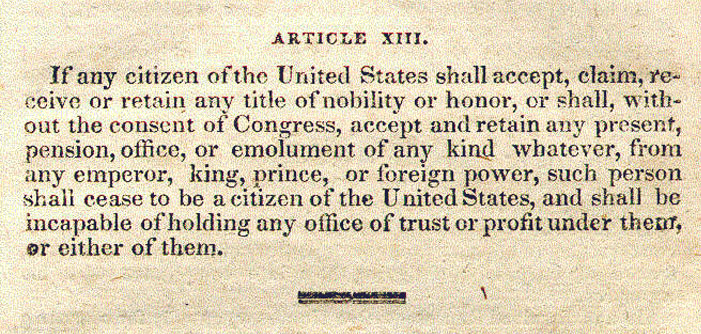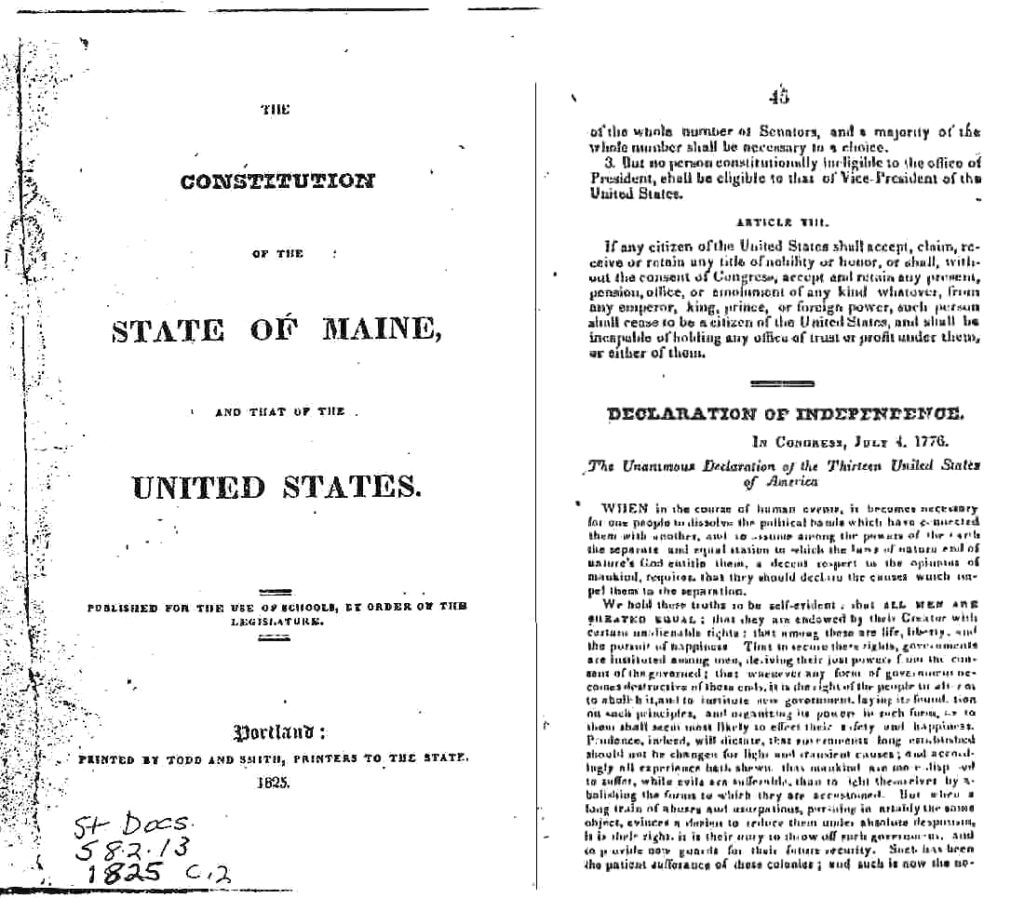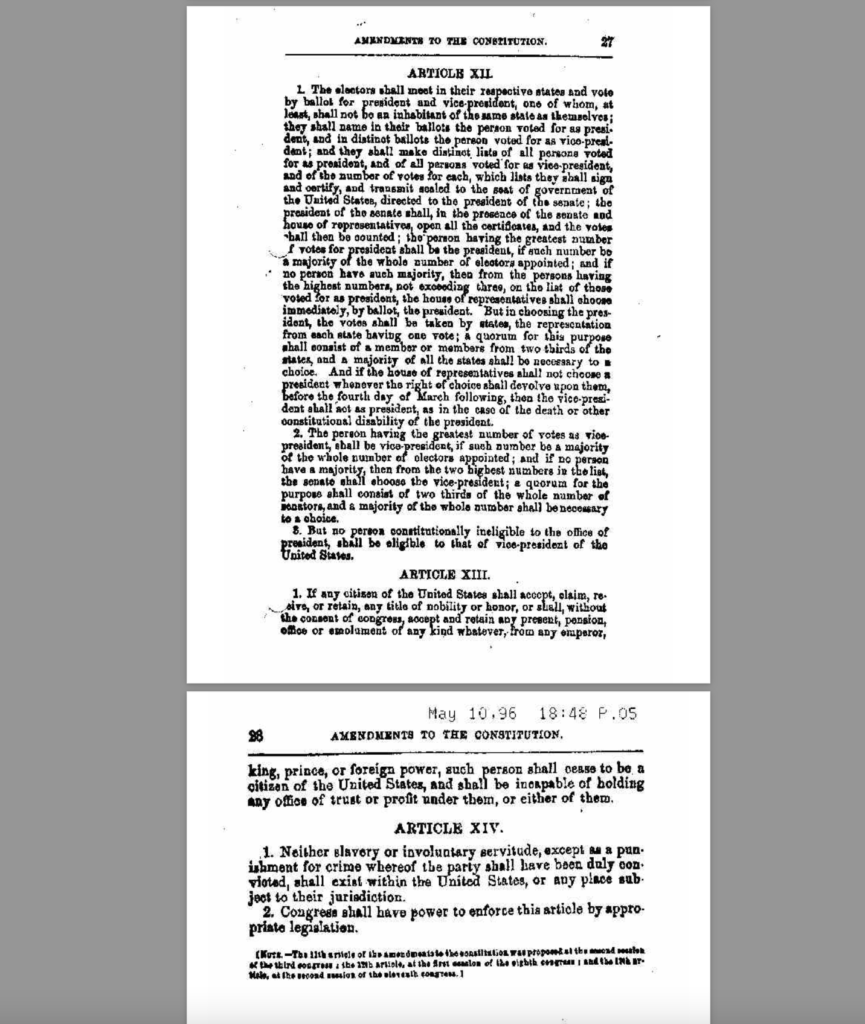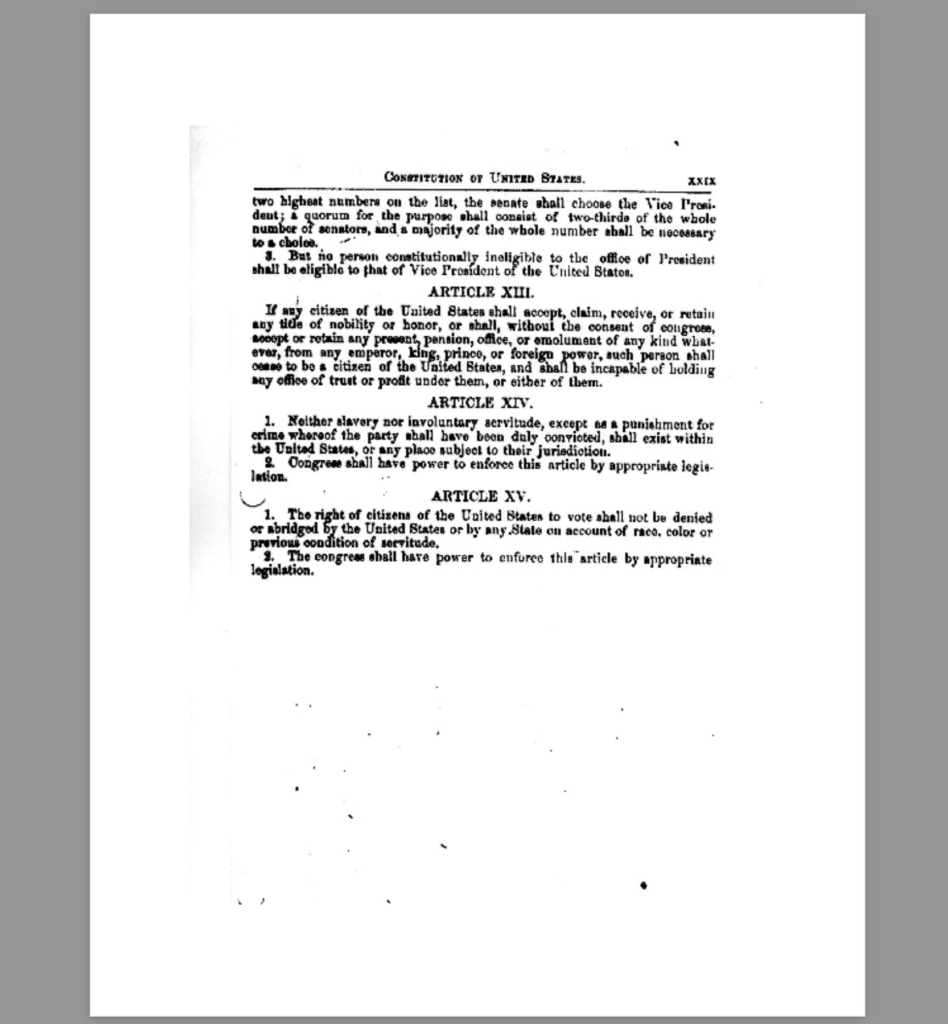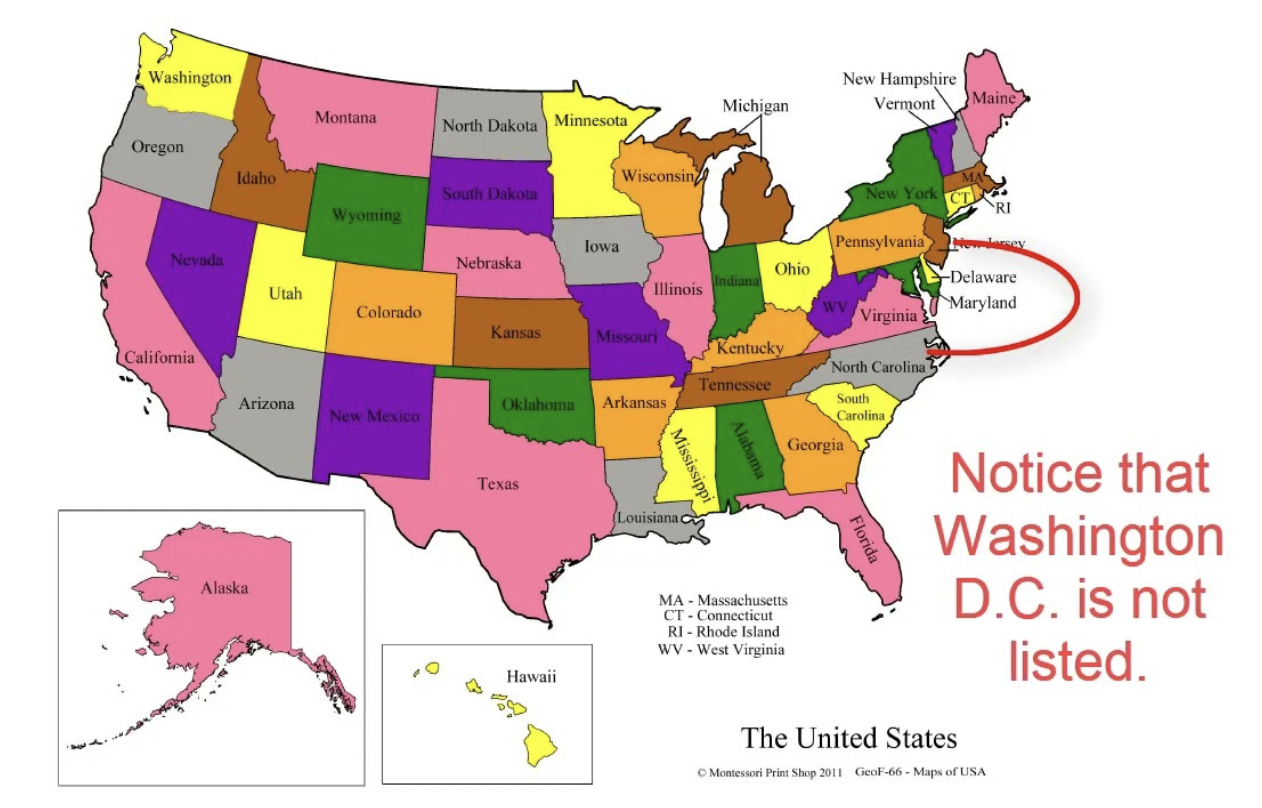“If any citizen of the United States shall accept, claim, receive, or retain any title of nobility or honour, or shall without the consent of Congress, accept and retain any present, pension, office, or emolument of any kind whatever, from any Emperor, King, Prince, or foreign Power, such person shall cease to be a citizen of the United States, and shall be incapable of holding any office of trust or profit under them, or either of them.”
The Real Thirteenth Amendment, shown above, was ratified March 12, 1819 with the vote of the Virginia General Assembly to publish the Revised Code of the Laws of Virginia with this article of amendment included in the Constitution of the United States, and thus it became an integral part of the Constitution for the United States of America. This amendment added a heavy penalty, not included in the original exclusion of Titles of Nobility provided in Article I, Section 9 of the Constitution, upon any person holding or accepting a Title of Nobility or Honour, or receiving any emolument, other than their legitimate earnings, under any guise from external sources, by making that person “cease to be a citizen of the United States” and “incapable of holding any office of trust or profit under the them, or either of them.” This amendment was proposed, properly ratified, and was a matter of record in the several States archives until 1876, by which time it was quietly, and fraudulently “disappeared”, never repealed,during the period of Reconstruction after the Civil War and the presently acknowledged Thirteenth Amendment was substituted.The original records of the real Thirteenth Amendment were thought to be destroyed at the time of the burning of the capitol during the War of 1812, but have since been found in the archives of the British Museum library in London and in the archives of several of the States and territories. The fact of its existence had been lost to memory until researchers accidentally discovered in the public library at Belfast, Maine a copy of the 1825 Maine Constitution and that of the United States which included this amendment. Subsequent research shows that it was in the records of the ratifying states, and subsequently admitted states and territories until 1876.
The last to drop it from record was the Territory of Wyoming after 1876. The most intriguing discovery was the 1867 Colorado Territory edition which includes both the “missing” Thirteenth Amendment and the current 13th Amendment, on the same page. The current 13th Amendment is listed as the 14th Amendment in the 1867 Colorado edition. Ref. colo68-1.jpg, colo68-2.jpg, colo68-3.jpg, colo68-4.jpg, and colo68-5.jpg.
The 1876 Laws of Wyoming similarly show the “missing” Thirteenth Amendment, the current 13th Amendment (freeing the slaves), and the current 15th Amendment on the same page. The current 13th Amendment is listed as the 14th and the current 15th Amendment is listed as the 15th, the current 14th amendment being omitted in the 1876 Wyoming edition. Graphics of these may be viewed by clicking on these links,wyo76-1.jpg, wyo76-2.jpg, wyo76-3.jpg
The Founders Fathers of Our Nation held an intense disdain and distrust of a privileged “Nobility” as a result of a long history, during Colonial times, of abuses and excesses against the Rights of Man and the established Common Law and Constitutions by the privileged “Nobility”, and therefore placed in the new Constitution two injunctions against the use or recognition of “Titles of Nobility or Honor” and acceptance of any emoluments whatever from external sources, the first pertaining to the federal government, Article I, Section 9, and the second pertaining to the individual states, Article I, Section 10.
The Revolutionary War for Independence was primarily waged to eliminate these abuses and excesses of the “Nobility” from the life of the Nation, recognizing the Equality of all men. As there was no penalty attached to accepting, claiming, receiving or retaining a title of nobility or honor or emoluments in the Constitution as originally ratified, the Thirteenth Amendment was proposed in December of 1809to institute penalty for accepting or using a “Title of Nobility or Honour” to set oneself apart from, or superior to, or possessing of any special privileges or immunities not available to any other citizen of the United States. It also instituted the same penalty for accepting and retaining any present, pension, office, or emolument of any kind whatever, from any Emperor, King, Prince, or foreign Power. An emolument is payment in any form for services rendered or to be rendered, or as understood today, a graft or a bribe.
Thus it was, that on January 18th of 1810, Senators led by Philip Reed of Maryland issued their first version of a proposed amendment to the Constitution, (known now as the T.O.N. or TONA, or more properly — the original Thirteenth Article of Amendment to the Constitution for the United States of America). Records show that the vote to send the final version of the amendment to the states for ratification was taken on Thursday, April 26th, first, a motion to delay voting on the proposed amendment was defeated 8-20, then the proposal was approved by the margin of 26 to 1, with seven Senators either absent or not voting. Biographical data of the Senators in office at the time of the vote on the amendment may be found at Appendix II. They were very able and worthy men, some of the most extraordinary and illustrious Americans of that day.
The House of Representatives voted to approve the amendment May 1st, 1810. With considerable support both from Federalists in New York and Massachusetts, and Democratic-Republicans in the south, the amendment was approved by a vote of 87-3. Eighteen of the 21 members from Virginia voted for it. Seventeen of the 18 members from Pennsylvania voted for it, while those from New York numbered 7 for, 1 against, with 6 absent or not voting. Rhode Island’s Robert Jackson, Jr. was absent, but the Revolutionary War veteran Elisha R. Potter voted for it.
In its final form, as sent to the Legislatures of the seventeen States for ratification, it reads as follows:
“If any citizen of the United States shall accept, claim, receive, or retain any title of nobility or honour, or shall without the consent of Congress, accept and retain any present, pension, office, or emolument of any kind whatever, from any Emperor, King, Prince, or foreign Power, such person shall cease to be a citizen of the United States, and shall be incapable of holding any office of trust or profit under them, or either of them.”
The first state to ratify the amendment was Maryland, which did so Christmas Day, December 25, 1810. A Table showing the dates on which the remaining states voted to ratify or reject the amendment is shown at this hyperlink. So also are shown the official publications which researchers have uncovered in the various archives. The researchers are now in physical possession of other extant volumes of the same after years of searching old bookstores and auctions. The researchers’ collection also includes many private printings and newspapers that contain the Thirteenth in its proper place.
The ratification by Maryland was followed closely by Delaware, Pennsylvania, New Jersey, Georgia, North Carolina, Vermont, Kentucky, and Tennessee, all of which ratified the amendment in 1811. Massachusetts and New Hampshire ratified in 1812 by which time the War of 1812 had commenced. New York and Connecticut rejected the amendment in 1813 and Rhode Island did so in 1814. South Carolina tabled the proposal Dec. 21, 1814. This left the proposed amendment one shy of final ratification, the vote of Virginia either lost or not taken in the chaos and confusion of the War of 1812.
Authorized by an act of the Virginia General Assembly (February 15, 1817), the complete revision of the State’s laws were entrusted to five of Virginia’s most prominent lawyers and legal scholars: William Brockenbrough, Benjamin Watkins Leigh, Robert White, and judges of the supreme court of appeals, Spencer Roane and John Coalter. When their work was concluded, the Virginia General Assembly voted on March 12, 1819 to publish the Revised Code of the Laws of Virginia with both the Constitution of Virginia and the Constitution of the United States including the Thirteenth Amendment intact and in its proper place. Thus, the vote of Virginia was accomplished and the amendment was ratified.
The General Assembly of Virginia authorized the distribution of the Revised Code of 1819 with ten copies designated for the executive branch of Virginia, five copies for the Clerk of the General Assembly, and four copies for the Secretary of State of the United States; one copy each for Thomas Jefferson, James Madison, and President James Monroe; one copy each for the federal Senate, House, and Library of Congress, and one copy for every judge in the courts of the United States in Virginia. Thus was the Federal Government notified of the actions of the Virginia General Assembly ratifying the Thirteenth Amendment.
By February of 1820, sufficient copies of the Revised Code had been printed to make it available for public sale, and it was advertised as such in a Richmond newspaper. Research conducted on this subject indicates that at least six or seven other Virginia newspapers also carried advertisements for the new Code.
